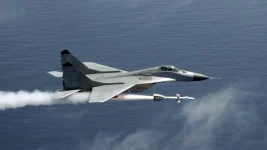- Views: 4K
- Replies: 9
A prominent Greek defence publication has issued a strong recommendation for Athens to deepen its strategic ties with New Delhi by acquiring advanced Indian missile systems.
In an article highlighting regional tensions with Turkey, the outlet Penta Postagma urged the Greek government to procure India's proven BrahMos supersonic cruise missile and to closely watch the development of the forthcoming "Dhvani" hypersonic missile, framing them as crucial tools for securing maritime dominance in the Aegean Sea.
The report suggests that strengthening the Indo-Hellenic relationship offers a comprehensive defence, industrial, and economic shield for Greece against the backdrop of Turkey's expanding naval influence.
The call comes as both nations find common ground in their respective geopolitical challenges, particularly in countering the strategic alliance between Turkey and Pakistan.
Spotlight on Advanced Indian Missile Technology
Central to the Greek outlet's analysis is India's next-generation hypersonic glide vehicle, reportedly named Dhvani. Developed by India's Defence Research and Development Organisation (DRDO), the missile is anticipated to undergo its first flight test by the end of 2025.This weapon represents a significant technological advancement over the highly successful BrahMos, a supersonic missile jointly developed by India and Russia that travels at approximately three times the speed of sound (Mach 3).
The Dhvani is being engineered to reach hypersonic speeds of Mach 5 to Mach 6, or about 7,400 km/h. This incredible velocity, combined with its ability to perform evasive maneuvers mid-flight, would make it exceedingly difficult for current-generation air defence systems, such as the American THAAD or Israel's Iron Dome, to intercept.
Its development under the Hypersonic Technology Demonstrator Vehicle (HSTDV) program places India in an elite group of nations, alongside the United States, Russia, and China, that are mastering hypersonic weapons technology.
The Dhvani utilises a scramjet engine and a two-stage launch system, allowing it to glide at low altitudes to evade radar detection before striking land or sea targets with high precision.
A Call for Immediate Defence Reinforcement
While the Dhvani missile represents a future capability, Penta Postagma made an urgent appeal for the immediate purchase of the BrahMos missile system.The publication argued that Greece should "urgently request the purchase of BrahMos missiles from our ally India," proposing that the weapon would create "conditions for denying maritime access to large parts of the Aegean for the Turkish Navy."
The BrahMos, which has a range between 290 and 500 kilometres, is a versatile missile capable of being launched from ships, submarines, and aircraft.
Its acquisition by the Hellenic Armed Forces would provide a powerful area-denial capability, significantly enhancing the country's coastal defence and altering the strategic balance in the Eastern Mediterranean.
The Philippines became the first foreign nation to purchase the BrahMos system in 2022, demonstrating India's growing role as a major defence exporter.
Broader Strategic and Economic Partnership
The proposed defence acquisitions are presented as part of a much wider strategic alignment between Athens and New Delhi.The Greek report emphasises that co-production agreements and joint ventures with the DRDO could revitalise Greece's domestic defence industry.
India's rapid progress in developing a wide array of military hardware, from fighter jets and drones to advanced radar systems, offers significant opportunities for collaboration.
Beyond military cooperation, the article points to substantial economic benefits.
Greece is positioned to be a key European hub for the India-Middle East-Europe Economic Corridor (IMEC), a trade route seen as a rival to China's Belt and Road Initiative.
This positions Greece as India's "gateway to the EU," potentially unlocking major bilateral trade and investment in sectors like technology and energy. This growing partnership is further reinforced by regular joint naval and air force exercises between the two nations.
This call to action is set against the tense geopolitical environment of the Aegean, where Turkey's assertive "Blue Homeland" (Mavi Vatan) maritime doctrine continues to challenge Greek sovereignty.
For Greece, a deepened alliance with a rising power like India is increasingly viewed as a critical step in safeguarding its national interests.


